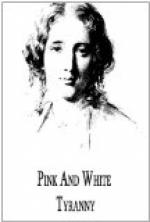Lillie’s presence, however, was all desirable; because it would draw the calls of two or three old New York families who had hitherto stood upon their dignity, and refused to acknowledge the shoddy aristocracy. The beautiful Mrs. John Seymour, therefore, was no less useful than ornamental, and advanced Mrs. Follingsbee’s purposes in her “Excelsior” movements.
“Now, I suppose,” said Mrs. Follingsbee to Lillie one day, when they had been out making fashionable calls together, “we really must call on Charlie’s wife, just to keep her quiet.”
“I thought you didn’t like her,” said Lillie.
“I don’t; I think she is dreadfully common,” said Mrs. Follingsbee: “she is one of those women who can’t talk any thing but baby, and bores Charlie half to death. But then, you know, when there is a liaison like mine with Charlie, one can’t be too careful to cultivate the wives. Les convenances, you know, are the all-important things. I send her presents constantly, and send my carriage around to take her to church or opera, or any thing that is going on, and have her children at my fancy parties: yet, for all that, the creature has not a particle of gratitude; those narrow-minded women never have. You know I am very susceptible to people’s atmospheres; and I always feel that that creature is just as full of spite and jealousy as she can stick in her skin.”
It will be remarked that this was one of those idiomatic phrases which got lodged in Mrs. Follingsbee’s head in a less cultivated period of her life, as a rusty needle sometimes hides in a cushion, coming out unexpectedly when excitement gives it an honest squeeze.
“Now, I should think,” pursued Mrs. Follingsbee, “that a woman who really loved her husband would be thankful to have him have such a rest from the disturbing family cares which smother a man’s genius, as a house like ours offers him. How can the artistic nature exercise itself in the very grind of the thing, when this child has a cold, and the other the croup; and there is fussing with mustard-paste and ipecac and paregoric,—all those realities, you know? Why, Charlie tells me he feels a great deal more affection for his children when he is all calm and tranquil in the little boudoir at our house; and he writes such lovely little poems about them, I must show you some of them. But this creature doesn’t appreciate them a bit: she has no poetry in her.”
“Well, I must say, I don’t think I should have,” said Lillie, honestly. “I should be just as mad as I could be, if John acted so.”
“Oh, my dear! the cases are different: Charlie has such peculiarities of genius. The artistic nature, you know, requires soothing.” Here they stopped, and rang at the door of a neat little house, and were ushered into a pair of those characteristic parlors which show that they have been arranged by a home-worshipper, and a mother. There were plants and birds and flowers, and little genre pictures of children, animals, and household interiors, arranged with a loving eye and hand.




